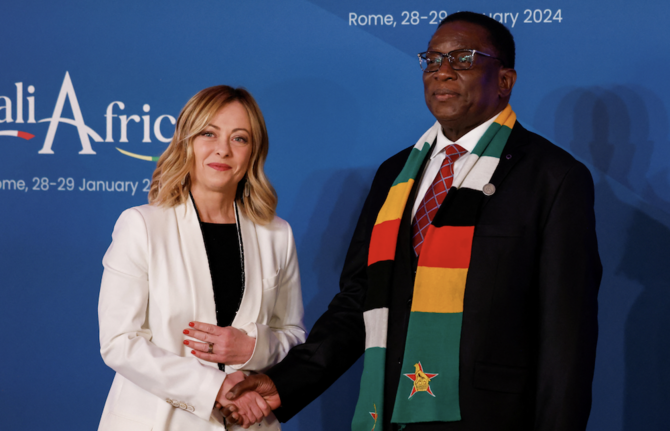Italy’s flawed plan to promote its interests in Africa

https://arab.news/g2cm7
Italy last week held its first Africa summit, during which Rome announced its Mattei plan for development ideas and programs across the continent. Italy’s current leadership is trying to put its imprint on key African states as part of a first attempt at laying out an investment program. But there are many questions about its intentions and the competition and cooperation involved with other actors, with a focus on the Horn of Africa.
The Italy-Africa conference was the first major event of Italy’s G7 presidency. Prime Minister Giorgia Meloni spoke at the Italian Senate to more than 20 African leaders and senior EU representatives. The Mattei plan, named after Enrico Mattei, the founder of Italy’s oil and gas company Eni, is to provide pilot renewable energy projects from Morocco to Ethiopia and Kenya. She added that these could be replicated in all African countries that express an interest in this new form of investment. The Mattei plan’s initial resources total €5.5 billion ($5.94 billion), including credits and cooperation funds. This amount is rather paltry but intentions count.
Meloni’s language about the Mattei plan — she said it was based on “a new approach: not predatory, not paternalistic, but not charitable either” — shows her aim to build economic and strategic partnerships among “equals.” Not particularly endearing.
To be sure, this Africa project is more for European political points-scoring on migration policy rather than anything else. Some are arguing that Rome’s move is tied more to keeping Africa calm so that northward refugee flows decline. And the Horn of Africa leaders visiting Rome, as well as other key African leaders, featured a number of well-known and troublesome faces to the West, notably Eritrean President Isaias Afwerki.
In his meetings with the Italian prime minister and other government officials, Afwerki highlighted the broad investment opportunities available in Eritrea across various sectors, such as roads, railways, ports, cable transportation, agriculture, innovation, fish resources and energy. Rome is likely seeking greater access to Eritrea’s untapped riches, despite the country’s massive hunger and human rights issues.
Naturally, the theme of colonialism was raised by the Eritrean ruler directly with Meloni. Afwerki made sure to remind his hosts that 150,000 Eritreans were forcibly conscripted by Italy. He wants the Italian archives opened in order to “build a bridge” with Rome. Afwerki’s raising of the colonial theme prompts questions about perception, especially with Italy’s history in Somalia.
Thus, Afwerki used his Rome visit to meet with President Hassan Sheikh Mohamud of Somalia and President William Ruto of Kenya. They focused on the development of bilateral ties to counter the Ethiopian move for cooperation with Somaliland and the building of port access. Interest in Eritrea is growing because of its key strategic location in the Red Sea.
The Italian government has been pursuing its own interests on this front in an effort to grab a piece of the pie.
Dr. Theodore Karasik
Ethiopian Prime Minister Abiy Ahmed was also at the Rome event and met with Meloni to discuss possible investments. Interestingly, Ahmed was in Geneva the day before being awarded a prize for food security initiatives by the UN Food and Agricultural Organization.
What about Italian energy interests in the Horn of Africa and East Africa? Meloni visited Addis Ababa last April. She was the first Western head of government to visit Ethiopia since the “end” of the Tigray war.
With her was Eni CEO Claudio Descalzi and they held a trilateral meeting with Ahmed and Mohamud to discuss “stability, reconstruction, oil drilling in Somalia and joint economic projects in the two countries.” Meloni’s trip built on a previous meeting she held with the Ethiopian and Somali leaders in February 2023. So, for more than a year now, the Italian government has been pursuing its own interests on this front in an effort to grab a piece of the pie.
Consequently, the Mattei plan aims to preserve the interests of Italian energy majors. Eni’s prospective interests up and down the east coast of Africa are always part of the company’s calculations, regardless of market conditions.
For example, Eni’s Mlima-1 deepwater well on the offshore Lamu Basin is part of Rome’s interest in Kenya, even though it was part of an International Court of Justice ruling against Nairobi and in Somalia’s favor. This G7 presidency event was focusing on Rome’s own interests across Africa, particularly in the Horn of Africa in the near term.
The Mattei plan’s appearance is contested by a number of parties because of the challenges it poses to other interests. The UK is keen on the Ethiopia-Berbera road. Questions arise as to how individual actors in the G7 will compete or cooperate. With violence rising across the continent, new and demanding challenges are arising quickly. These Italian efforts do not seem to interact well with ongoing EU or other initiatives. This Western factor gives other countries such as Russia and China an advantage in the African space.
- Dr. Theodore Karasik is a senior adviser to Gulf State Analytics in Washington DC. X: @KarasikTheodore










































